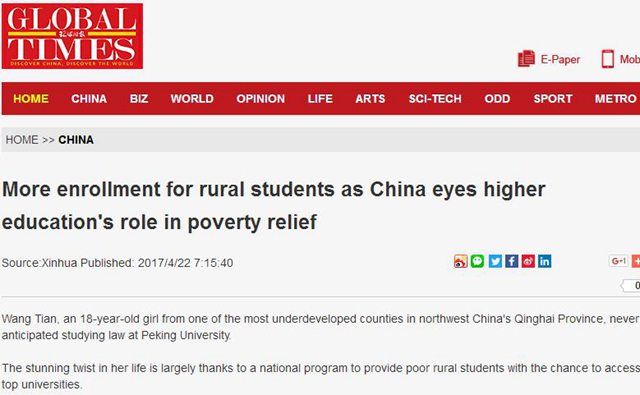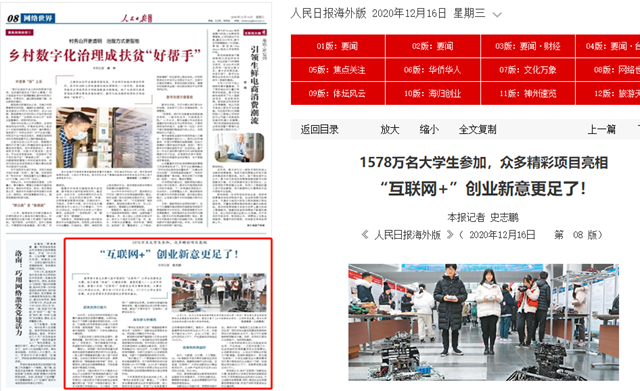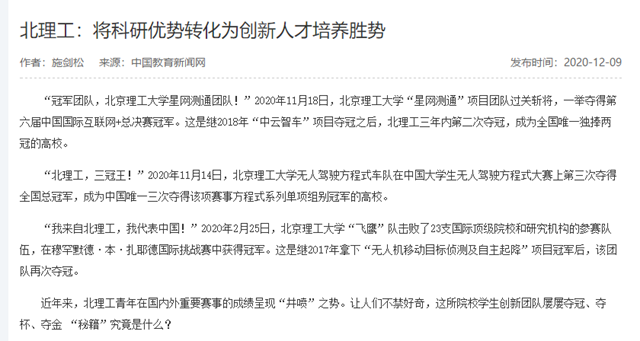【Global Times】BIT's programs help rural students to visit foreign universities at no cost
發(fā)布日期:2017-04-26 供稿:Global Times 編輯:楊晶 審核:王征 閱讀次數(shù):
原文標題:More enrollment for rural students as China eyes higher education's role in poverty relief
原文鏈接:http://www.globaltimes.cn/content/1043631.shtml

Wang Tian, an 18-year-old girl from one of the most underdeveloped counties in northwest China's Qinghai Province, never anticipated studying law at Peking University.
The stunning twist in her life is largely thanks to a national program to provide poor rural students with the chance to access top universities.
With vast disparities in teaching standards among different regions, high school graduates from underdeveloped areas once had very little chance of making into the best universities.
A sweeping reworking of the higher education system has changed all that and students from underdeveloped areas now compete on a more equal footing with those from more affluent parts of the country.
Enrollment quotas have increased recruitment of students from central, western and remote rural areas.
On April 14, the Ministry of Education asked top universities to do more to find students from rural or poor backgrounds. Universities were asked to enroll 10 percent more disadvantaged students in 2017. Strict supervision and greater transparency will ensure the suitability and eligibility of candidates.
Since 2014, students from rural areas have been allowed lower entry test scores and have had two percent of 95 key universities' admissions designated to them.
Another program in poverty-stricken areas, found university places for 183,000 students from impoverished counties from 2012 to 2015.
In 2013-2015, the increase in enrollment of these students in key universities remained above 10 percent each year.
HIGHER EDUCATION, BETTER FUTURE
In China, one child's success in the college entrance examination and future career sometimes mean an escape from poverty for an entire family.
To recruit more students from rural and poor areas, universities have simplified enrollment and given financial support to students from families with difficulties.
With an annual household income of about 15,000 yuan (2,200 USdollars) and a brother also studying in the university, there was no possibility her family could have afforded Wang Tian's tuition.
Grants and scholarship from the university and other sponsors total 18,000 yuan which covers all of her tuition and living expenses, Wang told Xinhua, adding that she will try to find a job immediately after graduation to support her family.
Her thoughts were echoed by Liu Hai from east China's Anhui Province, a beneficiary of the rural university students assistance program, who now devotes his time to helping others.
After leaving Beijing Institute of Technology (BIT) in 2014 with a master's degree, he chose to become a grassroots civil servant in an impoverished county in southwestern China's Guangxi Zhuang Autonomous Region.
During his childhood, Liu's family could barely make ends meet and borrowed money from everywhere to pay the tuition for his first degree. Immediately after graduating, he found a job and paid off the family debt of around 80,000 yuan. For his master's, thanks to assistance from the university and national student aid grants, he no longer needed to ask for money from home.
Favoring hard-working rural students helps them succeed in career and greatly enhances their family's living standards. Their example is also a tremendous encouragement to other kids in rural areas, said Liu.
Apart from the favorable enrollment policy and grants, some universities have found other ways to help students from disadvantaged backgrounds.
One-to-one services in career guidance are now common in many colleges to help them to find their desired jobs and make a new start both for themselves and the families.
Colleges such as BIT also have programs to help these students visit foreign universities at no cost.
"These students would never have the chance of traveling overseas given their families' finances, so we came up with ways to help them", said Sun Xiyan, director of the student-support office at BIT.
Money has also been poured into improving teaching in poor, rural areas to eradicate poverty at its source.
The key to guaranteeing equal educational rights lies in the improvement of local education, which requires more talented teachers, said Pang Lijuan, deputy director of Chinese institute of education policy study with Beijing Normal University.
By the end of 2015, the central budget had provided over one million rural teachers in poor areas with additional living allowances totaling 7.37 billion yuan.
The income of rural teachers has continuously increased and the job has become more appealing over the years, attracting more graduates.
分享到:

